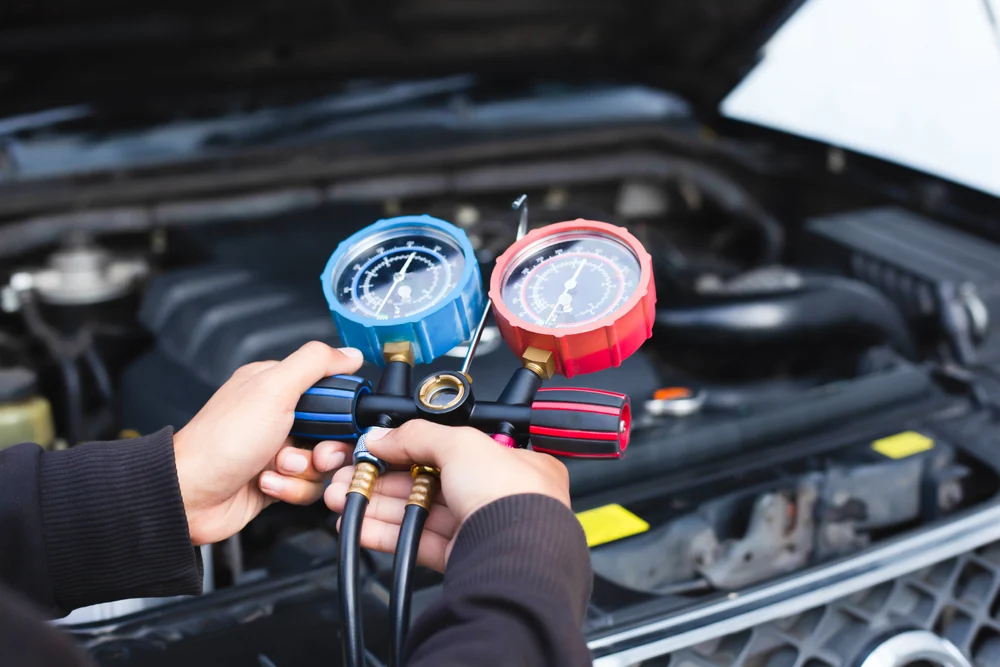How to Check If Your Car’s AC Compressor Is Working Properly
Is your car’s AC blowing warm air or making strange noises? The issue might be more serious than you think. Your car’s AC compressor plays a critical role in keeping things cool—but how do you know if it’s actually working? Before you spend money on repairs, here’s what you should look for to catch the problem early.
TL;DR:
Your car’s AC compressor is vital for cooling, and signs of failure include warm air from vents, strange noises, clutch issues, refrigerant leaks, higher fuel use, or electrical problems. You can check for issues with a visual inspection, listening for noises, testing clutch engagement, looking for leaks, and using pressure or electrical tests. While basic troubleshooting helps catch problems early, issues like refrigerant leaks, compressor non-engagement, grinding noises, or frequent cycling usually require a professional mechanic, since repairs often involve specialized tools, hazardous materials, and complex components.
Drive in comfort—Visit a trusted car AC repair shop in Brooklyn! 🌬️🏁

Signs Your AC Compressor Might Not Be Working
Your car’s AC compressor plays a crucial role in keeping your vehicle cool by circulating refrigerant throughout the system. When it begins to fail, it often shows clear warning signs. Catching these early can help you avoid a full system breakdown and costly repairs.
- Warm Air from Vents: If your AC is running but only blowing warm air, it may be a sign that the compressor isn’t circulating refrigerant effectively.
- Unusual Noises: Grinding, squealing, or rattling sounds while the AC is on could point to internal damage within the compressor.
- Compressor Clutch Issues: A compressor clutch that doesn’t engage or cycles too frequently can prevent the compressor from functioning properly.
- Leaking Refrigerant: Oily residue or hissing noises near the compressor area may indicate a refrigerant leak, which compromises cooling performance.
- Increased Fuel Consumption: A failing compressor can force the engine to work harder, resulting in reduced fuel efficiency.
- Tripped Circuit Breaker: Frequent electrical issues, like a tripped breaker, may signal that the compressor is drawing too much power due to a malfunction.
Ignoring these signs can lead to complete AC system failure, higher repair costs, and even damage to other components like the serpentine belt. If you notice any of these symptoms, it’s best to have your system checked as soon as possible.
Guide to Check If Your AC Compressor Is Working
If you suspect your car’s AC compressor isn’t working properly, a few simple checks can help you pinpoint the issue. Start with a visual inspection—look for visible damage, oil leaks, or worn-out drive belts around the compressor. Then, turn on the AC and listen for unusual noises like grinding, squealing, or rattling, which can indicate internal damage.
Next, check if the compressor clutch engages and spins while the AC is running. If it doesn’t engage or cycles too often, the compressor may be faulty. To detect a refrigerant leak, spray soapy water on the compressor area and look for bubbles, or use a UV light if leak detection dye was used previously.
System and Electrical Tests: Tools and Deeper Inspection
In addition to mechanical checks, test the system’s pressure using a manifold gauge set. Compare the high and low readings to the manufacturer’s specifications to confirm if the pressure levels are normal. Also, inspect the AC relay, fuse, and wiring for wear or damage, as electrical issues can prevent the compressor from functioning.
If any of these tests reveal abnormalities, your compressor may need repair or replacement. Taking the time to inspect it properly can help prevent more serious AC system issues down the road.
When to Call a Professional
While basic troubleshooting can help you identify obvious issues with your AC system, there are situations where it’s best to leave the job to a professional. Recognizing these moments early can prevent further damage and ensure your car’s AC is safely and properly repaired.
If the AC compressor isn’t engaging at all, it may point to a deeper issue with the clutch, electrical components, or low refrigerant levels—all of which require specialized tools and knowledge to diagnose and repair. Similarly, if you detect refrigerant leaks, it’s critical to contact a certified technician. Refrigerant handling is regulated and demands special equipment for safe and legal servicing.
Loud grinding noises coming from the AC system often signal internal compressor damage, which typically calls for a full replacement—something best handled by an experienced mechanic. Also, if your AC system cycles on and off frequently, it may be due to pressure fluctuations or an electrical fault, both of which require professional diagnostics to resolve.
Finally, if your DIY efforts don’t fix the issue, don’t keep guessing. AC compressor repairs involve complex components and hazardous materials, so calling a professional can save time, reduce stress, and help you avoid costly mistakes down the line.
Key Takeaways:
- Role of AC Compressor: The compressor is essential for circulating refrigerant and keeping the car cool; failure leads to poor performance and potential system damage.
- Warning Signs of Failure: Warm air from vents, strange noises, clutch issues, refrigerant leaks, increased fuel use, and electrical problems indicate compressor trouble.
- Basic Checks: Inspect visually for leaks or damage, listen for unusual noises, and check if the clutch engages; test for refrigerant leaks with soapy water or UV light.
- Advanced Testing: Use manifold gauges to compare pressure levels with specifications and inspect electrical components like relays, fuses, and wiring.
- Professional Help Needed: Seek a mechanic if the compressor won’t engage, leaks refrigerant, makes loud grinding noises, or cycles frequently, as these require specialized tools and expertise.
- Risks of Ignoring Issues: Neglecting symptoms can cause full system breakdown, higher repair costs, and damage to other engine components.
Reviewed by Carlos Jimenez – Mechanic
